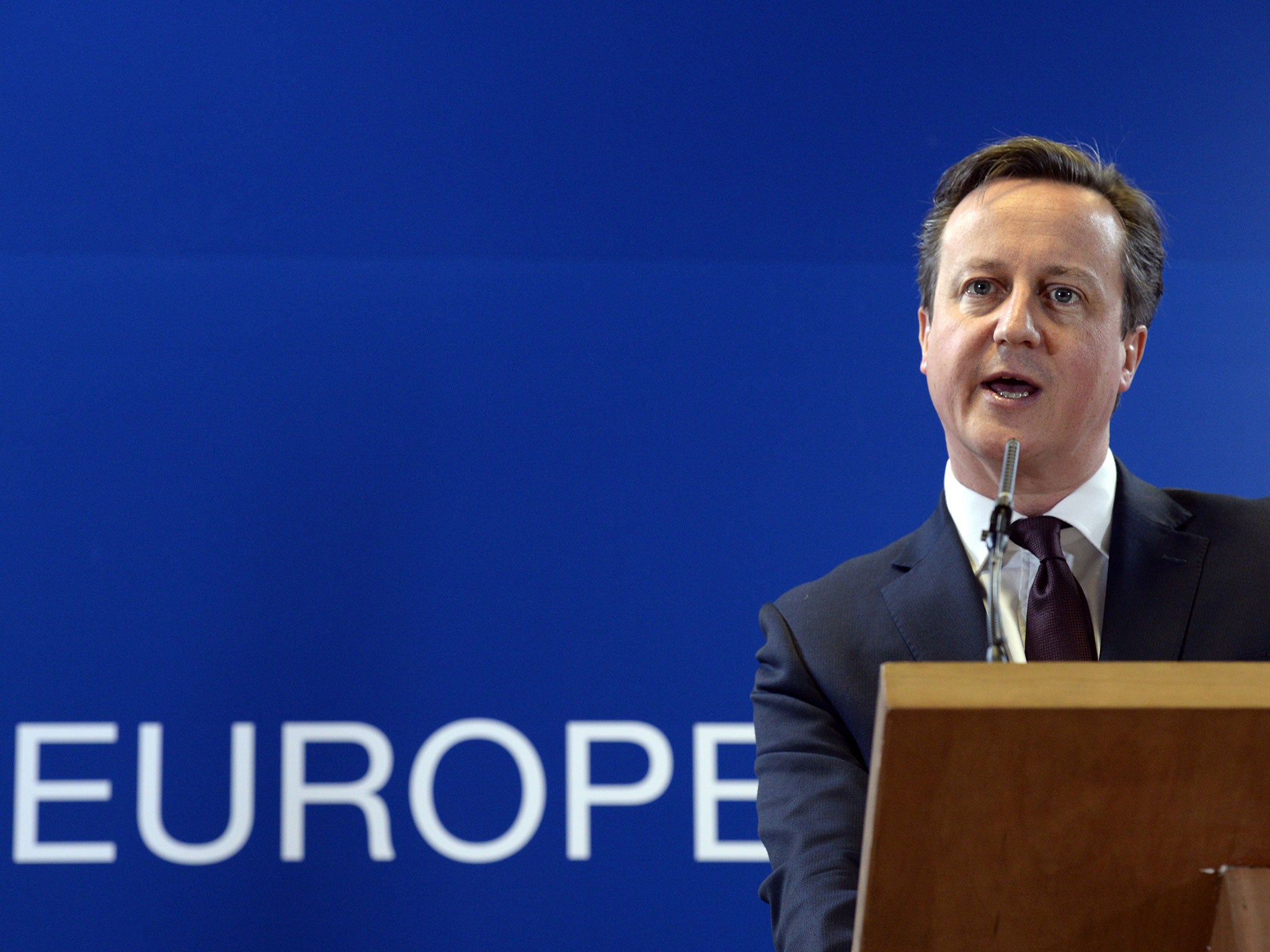EU referendum: Britain could thrive outside Europe, claims David Cameron
The Prime Minister will say the UK is no longer 'the sick man of Europe' as he lays out his demands for reform

Your support helps us to tell the story
From reproductive rights to climate change to Big Tech, The Independent is on the ground when the story is developing. Whether it's investigating the financials of Elon Musk's pro-Trump PAC or producing our latest documentary, 'The A Word', which shines a light on the American women fighting for reproductive rights, we know how important it is to parse out the facts from the messaging.
At such a critical moment in US history, we need reporters on the ground. Your donation allows us to keep sending journalists to speak to both sides of the story.
The Independent is trusted by Americans across the entire political spectrum. And unlike many other quality news outlets, we choose not to lock Americans out of our reporting and analysis with paywalls. We believe quality journalism should be available to everyone, paid for by those who can afford it.
Your support makes all the difference.Britain is no longer “the sick man of Europe” it was in 1970s and could continue to thrive outside of the EU, David Cameron will say this week, as he prepares to set out his demands for reform ahead of the In-Out referendum.
In some of his most strident language yet, Mr Cameron will tell voters that the vote will be “the final decision” for the country.
However, he will say that Britain could be successful in or out of Europe, and that voters must make a judgement based on the reforms he hopes to secure.
His comments will be interpreted as a warning to European leaders that he could still back a No vote if he fails to secure major concessions. However, the Foreign Secretary Philip Hammond has conceded that the UK would face “challenging” conditions outside the EU.
Mr Cameron is to set out the UK’s demands in a letter to the President of the European Council, Donald Tusk, on Tuesday.
In a speech the same day, he is expected to say that “the European question” has implications for both economic and national security, but will cite the country’s renewed ties with China and India as evidence that Britain could potentially thrive outside the EU.
“I am not saying for one moment that Britain couldn’t survive outside the European Union,” he will say.
“Last month the President of China spent a week in this country. This week, the Prime Minister of India will visit… No one doubts that Britain is a proud, successful, thriving country. A nation that has tuned round its fortunes through its own efforts. A far cry from the ‘sick man of Europe’ at the time we entered the European Economic Community four decades ago. Whether we could be successful outside the European Union is not the question. The question is whether we would be more successful in than out?”
The speech marks the beginning of a new phase of negotiations over Britain’s EU membership. The Prime Minister will set out “the broad outline” of his demands for reform in his letter to Mr Tusk this week, and will push for action from EU leaders during a key summit on the migration crisis in Valletta, Malta, on Wednesday.
Mr Cameron and the Chancellor, George Osborne, are understood to be seeking a “two-speed Europe”, allowing the 19 members of the eurozone to integrate more closely on finance, in exchange for exemptions for the non-euro countries on other EU-wide matters.
Mr Osborne held talks in Berlin last week with his German counterpart, Wolfgang Schäuble, and told German business leaders a deal could be struck. “You get a eurozone that works better; we get a guarantee that the eurozone’s decisions and costs are not imposed on us,” he said.
However, major sticking points remain, including on EU migration rules. The Government has pledged to hold the in/out referendum by the end of 2017. Speaking n the BBC’s Andrew Marr Show, Mr Hammond said that the British public would not be “fobbed off with a cosmetic alterations to the way the EU works”.
Using similarly bullish language to the Prime Minister, he said that if EU leaders “snub” reform demands, then voters would “think again” about membership. However, he admitted that the country would face “big challenges” outside the EU. “If we were not in the EU, we would have to find a different way of promoting our economy,” he said. “It is not impossible, but it would be challenging.”
In his speech, Mr Cameron will insist he has “every confidence” that negotiations would produce an agreement that was satisfactory to the UK and the EU’s 28 other member states.
Subscribe to Independent Premium to bookmark this article
Want to bookmark your favourite articles and stories to read or reference later? Start your Independent Premium subscription today.
Join our commenting forum
Join thought-provoking conversations, follow other Independent readers and see their replies
Comments